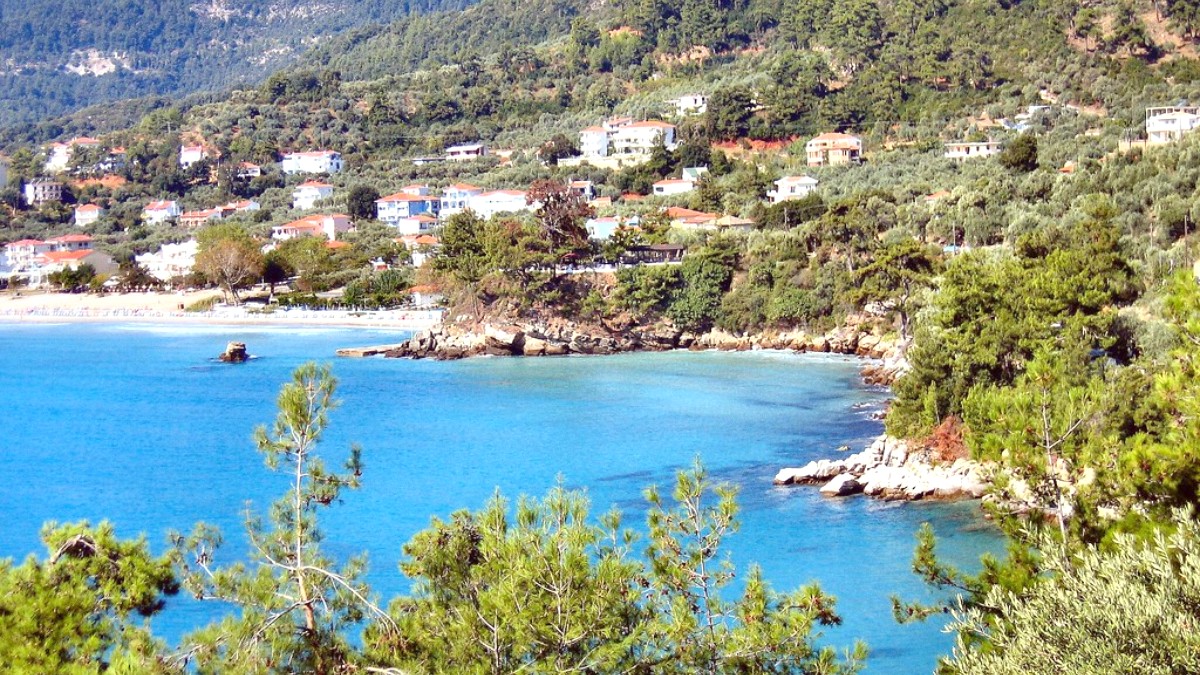
Northern Greece, Greece
Summer (June - August) temperatures typically range from 25°C to 35°C (77°F - 95°F), often rising above 30°C (86°F). Humidity levels are moderate to high, adding to the feeling of warmth. This period brings very little precipitation, making it ideal for consistent sunshine. Expect long, bright days, with the sun reaching its peak intensity around midday. Evenings remain warm, leading to comfortable conditions for outdoor dining and strolls.
Autumn (September - November) temperatures cool, ranging from 15°C to 25°C (59°F - 77°F). Humidity remains moderate. Precipitation increases gradually, especially as November approaches, bringing more noticeable rainfall. Early autumn still features plenty of sunshine and pleasant conditions. Late autumn moves towards cooler, wetter weather. Winter (December - February) temperatures generally stay between 5°C and 15°C (41°F - 59°F). Humidity levels are higher, and this marks the wettest period of the year. While not freezing, the air can feel damp, and overcast days are common. Snow is rare in the city and coastal areas but occurs in higher inland elevations. Spring (March - May) temperatures rise from 10°C to 20°C (50°F - 68°F). Humidity decreases, and precipitation lessens significantly. Days lengthen, and the air becomes crisp and clear.
Monolithi Beach in Preveza, a welcoming sight during the warmer months.
Expect crowds and peak prices.
Hottest weather, ideal for beach activities, all tourist services operate, lively atmosphere.
Peak prices, intense heat makes extended sightseeing uncomfortable.
Fewer crowds, comfortable temperatures.
Very pleasant temperatures (20-30°C), fewer crowds, lower prices, sea warm for swimming.
Some smaller tourist facilities might not operate fully.
Quiet, authentic, lower prices.
Few tourists, quiet local experience, significantly lower prices, prime for cultural exploration.
Cooler temperatures, higher chance of rain, many tourist businesses close.
June to September features the warmest sea temperatures and most reliable sunshine.
May, June, September, and October bring comfortable temperatures for exploring sites like Nicopolis, avoiding peak summer heat and larger crowds.
Autumn and spring migration periods (October-November and March-April) bring the best opportunities to observe a wide variety of bird species.
Traveling outside of peak summer makes for a comfortable and less crowded exploration of historical sites and natural beauty.
Low season travel often gives a more genuine local experience with fewer tourists.
Accommodation and flight prices are generally lower during the shoulder and low seasons.
Lush landscapes in spring and autumn, plus fewer crowds, create excellent photography opportunities.
Proper preparation leads to a smooth arrival and departure.
Greece is part of the Schengen Area, which permits free movement between 27 European countries.
Regardless of your visa status, certain documents are always a requirement for entry:
Greece uses the Euro, and while card payments are common, cash holds importance for smaller purchases.
| Travel Style | Accommodation | Food |
|---|---|---|
| Budget Traveler | €25-€50 (hostel/basic room) | €10-€20 (street food/supermarket/local taverna) |
| Mid-range Traveler | €60-€120 (mid-range hotel/apartment) | €20-€40 (taverna/mid-range restaurant) |
| Luxury Traveler | €130-€300+ (boutique hotel/villa) | €50+ (fine dining/upscale restaurants) |
A well-prepared health and wellness kit handles minor ailments and protects you from local environmental factors, leading to comfort throughout your trip.
No specific vaccinations are a requirement for entry. Confirm routine vaccinations (MMR, DTP, Polio, Flu) are current. Hepatitis A and B are often recommended. Consult a travel health professional 4-6 weeks before your trip.
Preveza gets high temperatures in summer. Use High-SPF sunscreen (SPF 30+), wear a Wide-brimmed hat, and Sunglasses. Stay hydrated with plenty of water. Seek shade during peak sun hours (12 PM - 4 PM).
Mosquitoes are present, especially near wetlands and during dusk. Use Insect repellent containing DEET or Picaridin. Consider long sleeves and trousers in the evenings. A portable Mosquito net might offer extra protection.
Travel Insurance is strongly advised for all travelers.
Greece operates a national healthcare system. EU/EEA citizens with an EHIC card gain access to state-provided healthcare. Non-EU citizens should secure comprehensive travel insurance for medical emergencies, hospitalization, and repatriation. Look for policies that cover emergency medical expenses and evacuation.
Preveza has a General Hospital. Local clinics and private doctors are available for non-emergencies. Pharmacies (Farmakeio), marked by a green cross, are widespread and can offer advice for minor ailments. Many pharmacists speak English.
The risk of severe stomach upset is low. Practice good hand hygiene before eating.
Tap water in Preveza city is generally safe for drinking. Many visitors prefer the taste of Bottled water, which is widely available. In rural areas or with a sensitive stomach, sticking to bottled water is a safer choice. Use a Reusable water bottle to lessen plastic waste.
Food hygiene standards in Greek restaurants and hotels are generally good. Choose busy establishments, which suggest high turnover of fresh ingredients. Observe how food is handled, especially with street food, to confirm cleanliness.
Preveza counts as a very safe destination with low crime rates. Petty crime like pickpocketing is rare but keep an eye on belongings in crowded areas. All neighborhoods are generally safe.
Greece lies in an active seismic zone. While major, damaging earthquakes are infrequent, minor tremors can occur.
Purchasing comprehensive travel insurance is strongly recommended for all travelers. A good policy covers medical emergencies, trip cancellation, and lost luggage.
112 (Connects to police, fire, ambulance, coast guard).
Police: 100, Ambulance: 166, Fire Department: 199, Coast Guard: 108.
1571 (Assists tourists with service issues or information).